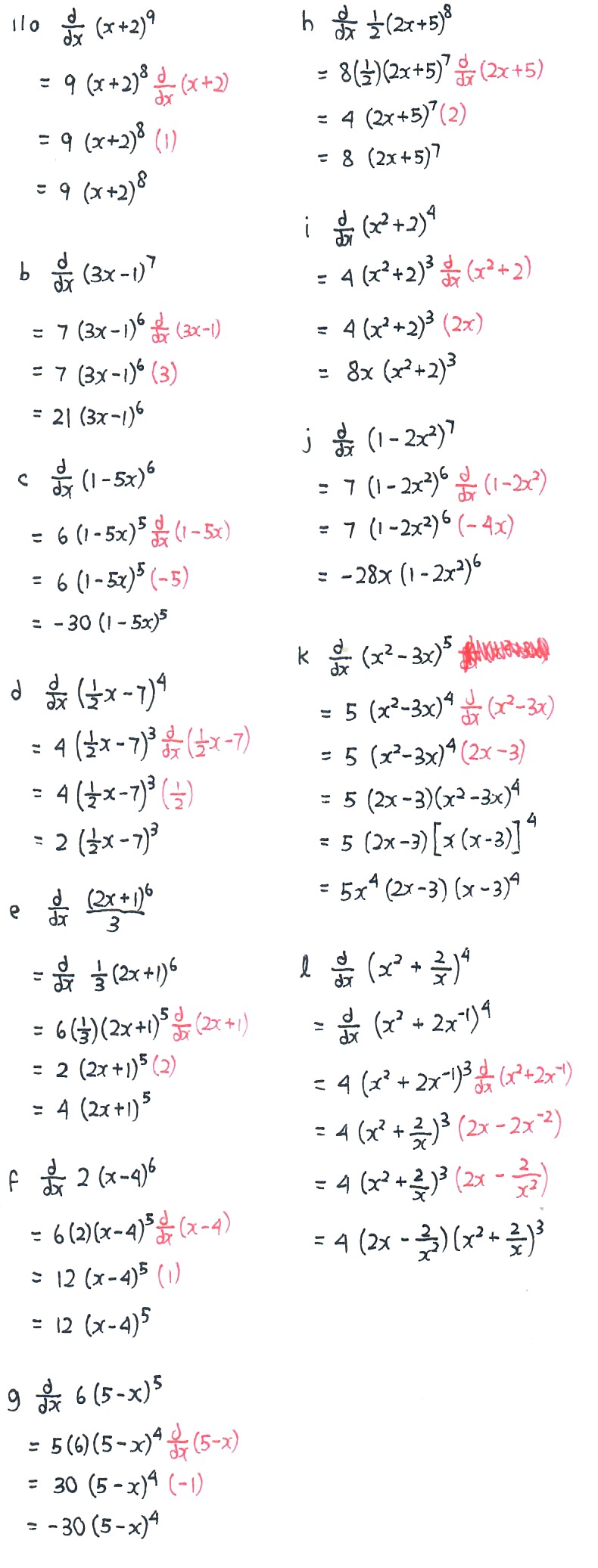Eric Nicholas K's answer to Belle's Year 10 Malaysia question.
done
{{ upvoteCount }} Upvotes
clear
{{ downvoteCount * -1 }} Downvotes
We use the chain rule to differentiate these terms. Note that when using the chain rule, you are only differentiating further the term inside the brackets without the power. Take part (a) for example, the extra term to be multiplied (in red ink) is the differential (or derivative) of (x + 2), not (x + 2)^4.
Date Posted:
5 years ago
I mean "differential of (x + 2), not (x + 2)^8".
may i know whats the difference between dy/dx and d/dx
what if i write dy/dx rather than writting d/dx?
what if i write dy/dx rather than writting d/dx?
Hi Belle!
That’s a good question to ask.
dy/dx is a symbol to describe the derivative of y with respect to x. Now, y is a function of x, or in other words, the value of y depends on the value of x.
Suppose the function is given as y = x2 + 2x + 1. Then dy/dx represents the derivative of y which has been defined to be x2 + 2x + 1.
dy/dx = d/dx (y). Here, the brackets do not mean multiplication (just like f(x) is not f times x). Since y = x2 + 2x + 1, dy/dx = d/dx (y) = d/dx (x2 + 2x + 1).
So in short, we write in one of the following forms.
1. If y = x2 + 2x + 1, then dy/dx = ...
Or
2. d/dx (x2 + 2x + 1) = ...
It is customary for us to not write dy/dx (x2 + 2x + 1) = ... even though they look the same. At the secondary level, it is not really that apparent to us why we do not write it that way. Once you proceed to higher levels, however, the terms dy and dx do mean something.
At higher levels, you will learn that dy/dx (x2 + 2x + 1) really means dy/dx times (x2 + 2x + 1) where dy/dx is an expression which would have been found. This is not the same as d/dx (x2 + 2x + 1) which is not a product of d/dx and x2 + 2x + 1.
That’s a good question to ask.
dy/dx is a symbol to describe the derivative of y with respect to x. Now, y is a function of x, or in other words, the value of y depends on the value of x.
Suppose the function is given as y = x2 + 2x + 1. Then dy/dx represents the derivative of y which has been defined to be x2 + 2x + 1.
dy/dx = d/dx (y). Here, the brackets do not mean multiplication (just like f(x) is not f times x). Since y = x2 + 2x + 1, dy/dx = d/dx (y) = d/dx (x2 + 2x + 1).
So in short, we write in one of the following forms.
1. If y = x2 + 2x + 1, then dy/dx = ...
Or
2. d/dx (x2 + 2x + 1) = ...
It is customary for us to not write dy/dx (x2 + 2x + 1) = ... even though they look the same. At the secondary level, it is not really that apparent to us why we do not write it that way. Once you proceed to higher levels, however, the terms dy and dx do mean something.
At higher levels, you will learn that dy/dx (x2 + 2x + 1) really means dy/dx times (x2 + 2x + 1) where dy/dx is an expression which would have been found. This is not the same as d/dx (x2 + 2x + 1) which is not a product of d/dx and x2 + 2x + 1.
In Essence, if you want to write dy/dx = ..., you will need to introduce a variable y.
So if the question says “Differentiate (x + 2)^8 with respect to x”, and you wish to write dy/dx = ..., then we need to let y = (x + 2)^8.
Note that the variables do not have to be y and x. It can be other symbols such as z, u and so on.
So if u = 5x2, then du/dx = 10x. If z = 10y3, then dz/dy = 30y2.
The phrase “with respect to x” really means something at higher levels, but for your level, you can pretend it means nothing.
So if the question says “Differentiate (x + 2)^8 with respect to x”, and you wish to write dy/dx = ..., then we need to let y = (x + 2)^8.
Note that the variables do not have to be y and x. It can be other symbols such as z, u and so on.
So if u = 5x2, then du/dx = 10x. If z = 10y3, then dz/dy = 30y2.
The phrase “with respect to x” really means something at higher levels, but for your level, you can pretend it means nothing.
oh alright thank you



